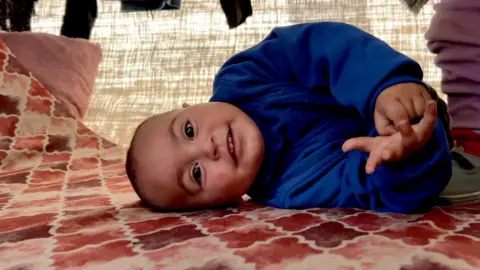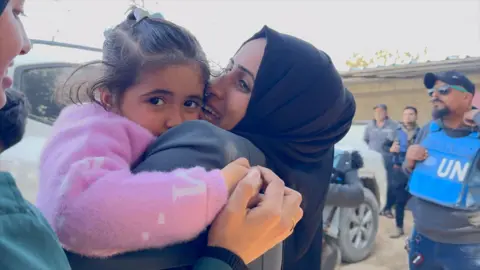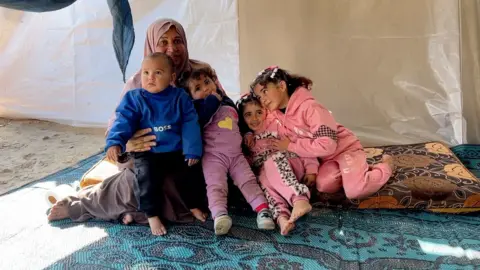The struggle to reunite children with families in war-torn Gaza
 BBC
BBCThey are smiling now as they play together in the sand at al-Mawasi tent camp in southern Gaza, but the children of the Masri family have survived horrific events.
"Their lives were in danger, they were exposed to so much killing and destruction," says their grandmother, Kawther al-Masri.
An Israeli bombing six weeks ago struck their home in the northern town of Beit Lahia, killing the parents of one-year-old Jamal and the mother and two young sisters of his cousins Maria, Jana and Zeina, aged from two to nine. The girls' father was arrested by Israeli forces more than a year ago.
When the children were pulled from the rubble, they were injured and alone.
Since the start of the war in Gaza, more than 14,500 children have reportedly been killed, thousands more injured and an estimated 17,000 have been left unaccompanied or separated from the family members who would ordinarily care for them.
Some are too young to know their names and remain unidentified.
In a chaotic situation amid bombings and mass displacement, the UN's children's agency, Unicef, has managed to reunite just 63 children with their parents or guardians. Last month, the BBC followed the story of the four Masri cousins.
"The happiness of their return is indescribable, but it's overshadowed with sadness - they came back without their parents," Kawther al-Masri told us.

Initially, the news that reached Kawther in mid-November was that all of her loved ones who had remained in the family's house in northern Gaza had been killed. But she says that after she prayed, word reached her that three of her grandchildren were still alive.
She immediately knew that she had to bring them to her. "I longed for them," she explains. "Honestly, I wished I could go to the North and fetch them, but God's will is above everything."
For more than a year now, Israel has divided the northern third of the Gaza Strip from the southern two-thirds along the line of a valley, Wadi Gaza. Humanitarian workers have to carry out special co-ordination to cross the Israeli military zone bisecting the territory.
After Kawther collected the documents she needed, Unicef carried out its own welfare checks and went through a laborious process to arrange to move the Masri children.
As the four bereaved cousins underwent medical treatment, distant relatives had looked after them. Unicef filmed their emotional goodbye before it took the children away in armoured vehicles.
The short distance from Gaza City to Deir al-Balah where the convoy was heading now involves crossing an Israeli checkpoint, it takes a long time to drive and can be very risky as the war rages on. Yet Unicef says it is prioritising child reunifications.
"The challenges are multiple," says Rosalia Bollen, a Unicef spokeswoman. "But we're talking here about highly vulnerable children."
"These are stories of loss – of deep mental trauma and physical trauma and for these children to recover. The fact that they've been reunified with one or both parents, or a family member, is extremely, extremely important."

Kawther describes an agonising wait on the day the children were due to arrive until finally Unicef telephoned. She hadn't seen her grandchildren for 14 months.
"I didn't know who to hug first!" she exclaims. "The first one I hugged was Jana and then Zeina. I kissed her and hugged her."
"My son's children used to call me 'Kuko' and although Zeina couldn't speak the last time I saw her, she knew this was my nickname. She kept asking: 'Are you Kuko? Are you the one I came here for?' And I told her I was. She felt safe."
The story of the Masri family is not uncommon. They were split up in the early days of the war.
A week after the 7 October 2023 Hamas assault which killed some 1,200 people in southern Israel, the Israeli military ordered 1.1 million people in northern Gaza to move south, signalling that it planned to start a ground invasion.
Kawther and most of her children quickly packed up and moved to Rafah, but transportation for her two sons, Ramadan and Hamza, fell through. They ended up staying behind with their wives – one of whom was pregnant – and small children.
In November 2023, Hamza was arrested by Israeli forces in Beit Lahia. His close relatives insist that he and they are farmers with no political affiliations. The BBC has been unable to get information from the Israeli authorities about what happened to Hamza.
Israel has detained thousands of Gazans during the war, saying they are suspected of terrorism.
"This has been our fate," Kawthar tells us despairingly. "We lost our homes, our land and our loved ones, and we were divided between the North and the South."
With so many people unaccounted for, many turn to the International Committee of the Red Cross (ICRC) for help. It takes detailed information and cross-checks this with sources it can access, such as hospital lists and names of returned detainees.
More than 8,300 cases have been reported to the organisation but only about 2,100 have been closed. Of these, only a small number have led to family reunifications.
"People are in limbo – they don't know whether their family member is alive, whether they are injured or in hospital, whether they are trapped under rubble or whether they will see them again," says Sarah Davies from the ICRC.
Doctors and staff at hospitals also play a part in trying to connect their patients with loved ones.
Nearly a year ago, the BBC filmed a newborn baby who had been delivered by Caesarean section after her mother was killed in an Israeli air strike. Medics called the little girl "the daughter of Hanna Abu Amsha" and kept information about her in the hope her relatives could track her down.
Recently, the nursery at Al-Aqsa Martyrs' Hospital in Deir al-Balah told us that the baby was eventually handed over to her father and was doing well.
Days after the Masri family's reunion, a local journalist working with the BBC visited Kawther and her grandchildren in the al-Mawasi displaced people's camp where they now live in a tent. With aid in short supply, Unicef had given them help to get extra food and medication.
The girls also had warm jackets – some protection against the cold temperatures which have led to several babies dying of hypothermia, including at the camp on the coast, close to the city of Khan Younis.
While Kawther is relieved to have the children with her, she still does not feel they are safe. She worries about how to care for them and their mental health.
"They are in shock," she says. "No matter how much we try to distract the girls and avoid talking of the war, every now and then they wander off in thought."
"When night falls, they are afraid. They say: 'There's a plane, there's a strike.' They ask me: 'Is it dawn yet?' and only when morning comes, they start to feel reassured."
Kawther says she desperately hopes for a ceasefire and for her grandchildren to rebuild their lives. Not to become part of a lost generation.
